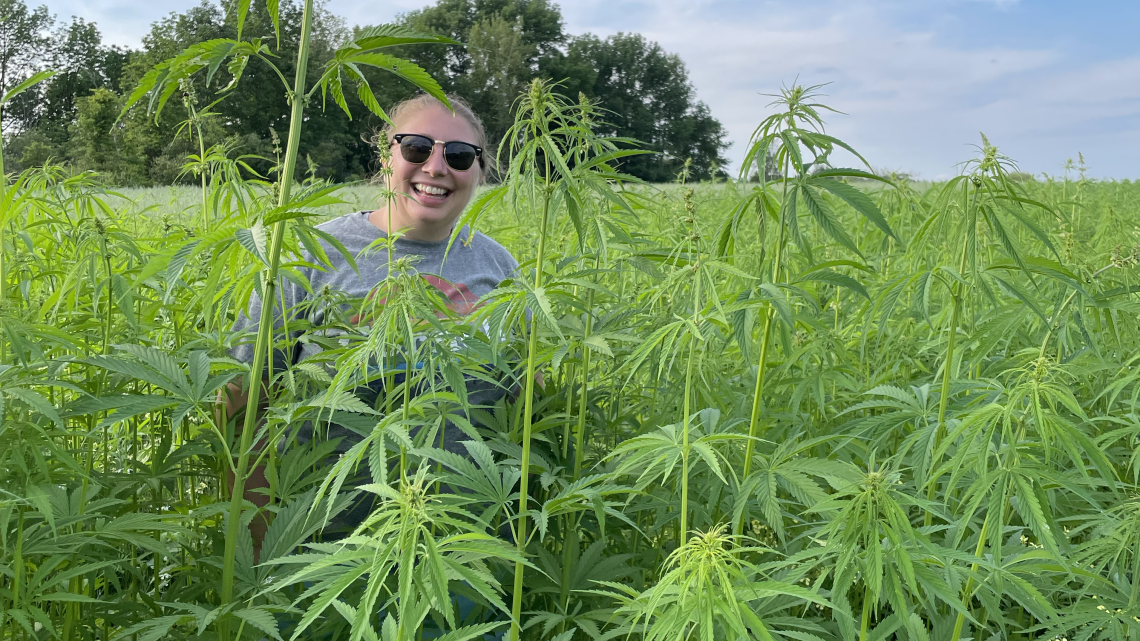
Hailee Greene in one of her fields of hemp.
News directly from Cornell's colleges and centers
Seeing a bright future for hemp in NYS
By Kathy Hovis
Hailee Greene MBA ’24 has a passion for the cannabis plant, but not the kind you might imagine.
She’s focused on the industrial side of the hemp industry and finding a way to increase the production of products made from the plant – products she said could revolutionize the way we make houses, fuel our cars and craft our clothing.
Greene’s company, GreeneAcres Processing, is moving forward with plans to build the first industrial hemp processing facility in the northeast, hopefully on a plot of land somewhere near her family farm in Lewis County, N.Y.
Her operation will grow hemp using regenerative practices, provide processing capabilities to independent growers and sell carbon credits to create additional revenue.
Greene’s company was selected for the Blackstone LaunchPad Fellowship and the Johnson Summer Startup Accelerator at Cornell and was one of 20 companies showcased at the Bangkok Business Challenge in June, the first Cornell team since 2017. She’s working on the idea with fellow student Danielle Falcon MBA ’24.
“We were thinking of renting out some land at my family farm for adult use cannabis growers, but when I started digging in and learning what a sustainable plant hemp is, I had the idea that I could do better than that,” she said. “A single acre of hemp can sequester up to four times the amount of carbon as one acre of trees and many hemp-based products can continue to sequester carbon post-processing.”
Those products can range from paper to clothing to fuel to fire-retardant building materials and bioplastics. “People don’t know this, but in 1941 Henry Ford designed a bioplastic Model-T made with a variety of sustainable items including hemp and it ran completely on hemp biofuel,” she said. “There are an astronomical number of things you can make with it, but there’s been a lack of U.S. research for nearly the last 100 years.”
Industrial hemp has proven successful in Canada, China and France, Greene said, but the lack of industrial processing equipment in the U.S. has hindered its growth here. The amount of hemp planted in New York State has plummeted from 2019 due to the boom and bust of the CBD market, she said, but she looks forward to building the industrial hemp supply chain in the state.
“We’ve gotten incredible support and resources from the Center for Sustainable Global Enterprise, the Smith Family Business Initiative, Entrepreneurship at Cornell, Blackstone LaunchPad and also just from our Johnson professors,” Greene said, adding that those professors have reviewed dozens of pitch decks and offered advice at many meetings. Greene said she’s also extremely grateful for the knowledge and resources from the hemp research program in the School of Integrative Plant Science, part of the College of Agriculture and Life Sciences.
Her next steps include continuing her talks with farmers and potential hemp buyers, then lining up agreements so she can approach investors and banks this fall for financing. Her startup costs tally about $7 million. She hopes to plant 100 acres of hemp next summer and have her processing facility up and ready to go by the fall of 2024.
Growing up on a farm, Greene said a prime motivator for Greenacres Processing is her desire to help farmers.
“Farmers that I know work harder than anyone and they’re just scraping by,” she said. “I want to build a business that will help them and also create a more sustainable future for all of us.”
Media Contact
Get Cornell news delivered right to your inbox.
Subscribe
